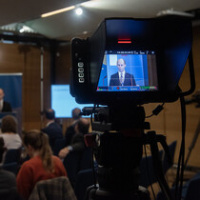Conference: “Institutional Reforms in Ageing Societies”
Az MTA TK Jogtudományi Intézet és a Pázmány Péter Katolikus Egyetem kétnapos nemzetközi konferenciája
Pázmány Péter Catholic University | Institute for Legal Studies |
“Institutional reforms in ageing societies”
Conference programme
Venue: Pázmány Péter Catholic University, Faculty of Law and Political Sciences
Address: Szentkirályi u. 28-30. Budapest, 1088
Participation at the conference is free, but subject to registration. Please send an email to institutional [dot] reform [at] tarki [dot] hu for registration.
Thursday, 8 June 2017
10:00-11:00 | Registration |
11:00-11:15 | Conference opening Prof. Szabolcs Szuromi (Rector of Pázmány Péter Catholic University) Prof. András Jakab (Director, Institute for Legal Studies, HAS CC) |
11:15-12:30 | Keynote Lecture 1. Prof. Pieter Vanhuysse (DaWS, University of Southern Denmark): What Age Groups Give Each Other: Pro-elderly Welfare States within a Child-oriented Europe |
12:30-13:15 | Lunch |
13:15:14:45 | Parallel Sessions A, B |
14:45-15:00 | Coffee break |
15:00-16:30 | Parallel Sessions C, D |
16:30-17:00 | Coffee break |
17:00-18:30 | Parallel Sessions E, F |
Friday, 9 June 2017
09:30-10:45 | Keynote lecture 2. Prof. Axel Gosseries (Université Catholique de Louvain): Intergenerational Cooperation and Institutional Design |
10:45-11:15 | Coffee break |
11:15-12:45 | Session G |
12:45-13:45 | Lunch |
13:45-15:00 | Keynote lecture 3. Prof. Rainer Grote (MPI Comparative Public Law, Heidelberg): The Constitutional Law of Ageing Societies – Outline of a Research Agenda |
15:00-15:30 | Coffee break |
15:30-17:30 | Session H |
Programme of sessions
Session A: Attitudes towards intergenerational redistribution
- Juan J. Fernández, Gema García-Albacete, Antonio Jaime-Castillo and Jonas Radl
- (University Carlos III of Madrid): Priming or Framing? A Survey Experiment on the Role of Information and Frames on Attitudes towards Population Aging and Welfare Reforms
- Attila Gulyás and Béla Janky (HAS, Institute for Sociology): Voting Rights and Intergenerational Justice: Framing and Attitudes
- Dominik Lober (University of Konstanz): Older People’s Solidarity Towards the Younger Generations – A Matter of Relationships or of Deservingness?
Session B: Pension systems and reforms
- Magdolna Vallasek (Sapientia Hungarian University of Transylvania): Restoring or Destroying the Financial Sustainability of the Pension System? The Romanian Case
- Dorottya Szikra and Diána Kiss (HAS, Institute for Sociology; ELTE): Abandoning Compulsory Private Pensions in Hungary. Processes and Impacts
- Achim Kemmerling and Kristin Makszin (CEU; HAS, Institute for Political Sciences): Excessive Policy Volatility in Recent Pension Reforms in Eastern Europe and Latin America
Session C: Effects of ageing on the society and the welfare state
- Mika Vidlund, Niko Väänänen, Antti Mielonen and Kati Kuitto (Finnish Centre for Pensions): What is the Cost of Total Pension Provision and Who Pays the Bill? – Cross-national Comparison of Pension Contributions
- Róbert I. Gál and Márton Medgyesi (HDRI; Tárki): Redistribution in the Welfare State: Between Income Groups or Between Age Groups?
- Rza Kazimov (Humboldt-Universität, Berlin): Studying Electoral Participation in European Parliament: The Effect of Population Ageing on Aggregate Turnout Patterns in Elections to the European Parliament
Session D: Pension reforms and long-term care
- Dan Apăteanu (University of Oradea): The Reform of the Pension System in Romania
- Frank Bandau (Otto-Friedrich-Universität Bamberg): Partisan Politics in the Long Shadow of the Golden Age: The Case of Pension Reforms in Sweden and Britain
- Attila Bartha (HAS, Institute for Political Science): Technocratic Expertise versus Populist Governance? Explaining the Role of Political Elites in Pension Reforms in Southern and Central-Eastern Europe
- Hana Marikova (Institute of Sociology, Czech Academy of Sciences): Elder Care from the Historical and Gender Perspectives: the Case Study of the Czech Republic
Session E: Policy options to mitigate consequences of ageing
- Harald Künemund (University of Vechta): Life Expectancy, Retirement Age and Social Inequalities: Options for the Institutionalized Life Course
- Hans-Joachim Reinhard (University of Fulda): Challenge of Long-term Care in Ageing European Countries
- Andrzej Klimczuk (Warsaw School of Economics): The Emergence of the Creative Ageing Movement: Barriers and Challenges in the Countries of the European Union
Session F: Work and leisure among the elderly
- Kathrin Komp (Helsinki University): Couples Coordinating their Retirement Ages: A Lifetime of Coordination?
- Éva Berde and Mariann Rigó (Corvinus University Budapest; TU Dortmund): German or Hungarian Elders are Happier with their Work?
- Maria Alexandra d’Araújo, Stella Bettencourt da Câmara, Jaime R. S. Fonseca (Univ. of Lisbon): The Role of Leisure in a Social Response to Older Women
Session G: Institutions for ageing societies 1
- Inigo Gonzalez Ricoy (University of Barcelona): The Legitimacy of Intergenerational Institutions
- András Jakab (HAS, Institute for Legal Studies; PPCU): Sustainability in European Constitutional Law
- Michael Rose (Bergische Universität Wuppertal): Democratic Myopia and Future Generations. On Institutional Innovations, their Impact Potential and the Challenges of their Institutionalization
Session H: Institutions for ageing societies 2
- József Banyár (Corvinus University Budapest): Conflict or Fair Deal Between the Generations? Alternative Economics for Pensions
- Paul Bou-Habib (University of Essex): A Longevity Tax for Ageing Societies?
- Viktor Lőrincz (HAS, Institute for Legal Studies): Age and Capacity in Continental Law – Psychological Aspects
- Miklós Könczöl (HAS, Institute for Legal Studies; PPCU): Parental Proxy Voting and Paternalism
Forrás: jog.tk.mta.hu







